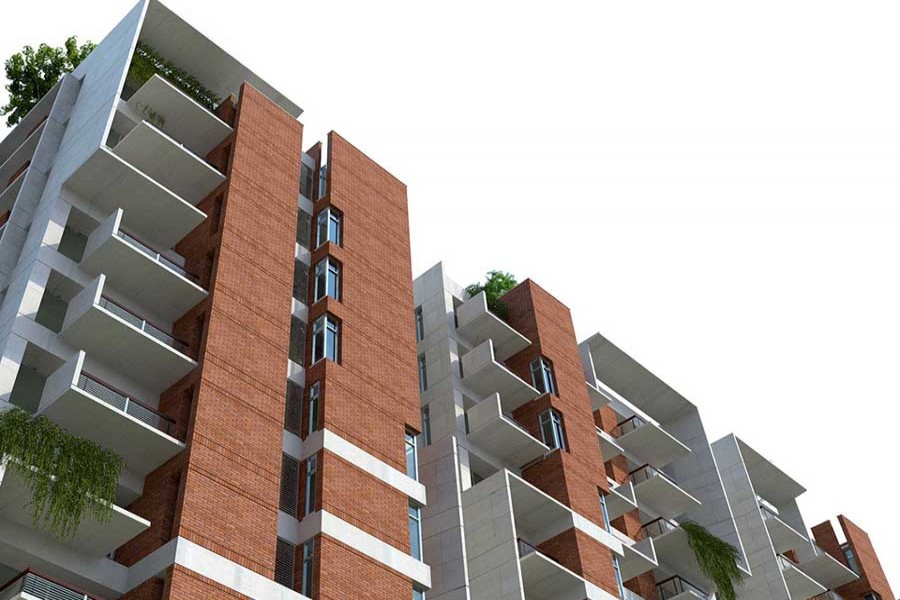
Published :
Updated :

Before Covid-19 hit the country, all activities in the real estate sector including construction, promotion and sales were encouraging. The upward trend of investment continued further in the 2020 when the amount of advances was recorded at around Tk 800 billion.
Now, it is getting difficult for the realtors to maintain relation with their clients, as many of them are unable to pay instalments, while the house builders cannot hand over flats within the stipulated time.
Most of the activities related with the sector have been suspended due to Covid-19 pandemic. Such a deadlock in such a vital sector has already resulted in unemployment of a huge number of people, and created uncertainty over massive investments.
It will be challenging for many of the realtors as well as linkage industries to continue paying salary to their staffs, if the situation prolongs.
The present situation is like a bolt from the blue for entrepreneurs as well as workers. The sector was getting revitalised before the Covid-19 outbreak after a spell of recession between 2012 and 2018.
However, some of the realtors started work on some of their projects on a limited scale. It is still uncertain when the situation will improve for starting their work in full swing. The realtors' future is connected with over 200 linkage industries such as steel rod, cement, ceramic ware and bricks.
At the beginning of the current year, the prospect of the sector appeared bright with increased demand of flats and plots among customers. The Real Estate and Housing Association of Bangladesh (REHAB) had formally requested the government for getting fund from the stimulus package.
In a recent letter to the finance minister, according to reports, REHAB said the sector is one of the worst-hit amid the epidemic. Some 3.5 million workers have been jobless, while another 0.1 million employees are on the verge of joblessness.
After overcoming the crisis period that started in 2012, the real estate sector started turning around in late 2018 thanks to the low-cost loan facility for the government employees and healthy national economic growth.
The volume of money pumped into the sector also increased significantly. According to the Bangladesh Bank data, the volume of banks' advances to the real estate sector was only Tk 408 billion in the fiscal year (FY) 2013-14. The advances continued to increase in the next few years. It reached Tk 800 billion in the fiscal year 2019.
Analysts believe the crisis is only for the time being. The government is taking different measures to save both entrepreneurs and investors. The sector will be back on track when the situation normalises, they say.
There is no denying that the housing sector is a productive one. It has created employment for millions of people, and helped boost linkage industries. Both the government and non-government financial institutions need to reduce interest rates and extend loans to help the sector overcome the present crisis.
The real estate and housing sector accounts for 7.8 per cent or Tk 1.415 trillion of the country's gross domestic product (GDP).
The sector saw at least 9.0 per cent growth earlier this year, thanks to the government's decision to extend low-cost home loans to public servants from fiscal 2018-19.
Based on location and grade of a government employee, he or she can now take loans starting from Tk 2.0 million to Tk 7.5 million at 10 per cent interest from public sector banks and the state-owned Bangladesh House Building Finance Corporation (HBFC). Of the 10 per cent interest rate, the government will foot 5.0 per cent and the employee will bear the rest.
As of December 2019, about 11,000 flats remain unsold, in contrast to 14,000 at the end of 2018. The sector would gain momentum if the interest rate for home loans for general public is brought down to single digit. At present, the interest rate on home loans ranges from 11 per cent to 13 per cent.
The government slashed registration fee to 11 per cent from 14-16 per cent of the property's price. In another positive move, the central bank raised the home loan ceiling to Tk 20 million from Tk 10 million and also allowed banks to provide loans up to 70 per cent of the property price.
In 2017, interest rates from home loans had dropped to single-digit figures, which had caused a surge in apartment purchase by middle-income families. Unfortunately, at the start of 2018, interest rates increased, which could have caused a slight dip in sales earlier in the year.
The cost of land is a challenge for making apartments affordable. If developers own the land of a project they can bring down the price of apartments. If they share the land with someone else, then prices go up.
Between 1972 and 2010, land prices in Dhaka city grew by an average of 100-125 per cent per year. Along with the rising price of land, construction costs are going up as well. Prices of cement and steel materials have increased steadily over the last few years. The local currency, taka, has been devalued against the US dollar which has also increased the cost of imported items.
Observers feel the industry needs more facilitating services from the government. To begin a project a developer has to get the clearance from banks. Then it has to go to capital development authority RAJUK for plan approval, obtain electricity and water connections, and permissions from other government agencies. If these services were made available under a one-stop service, the sector could have performed far better. In fact, the sector could have achieved double-digit growth had it been provided with provided adequate financial and infrastructural support.


 For all latest news, follow The Financial Express Google News channel.
For all latest news, follow The Financial Express Google News channel.